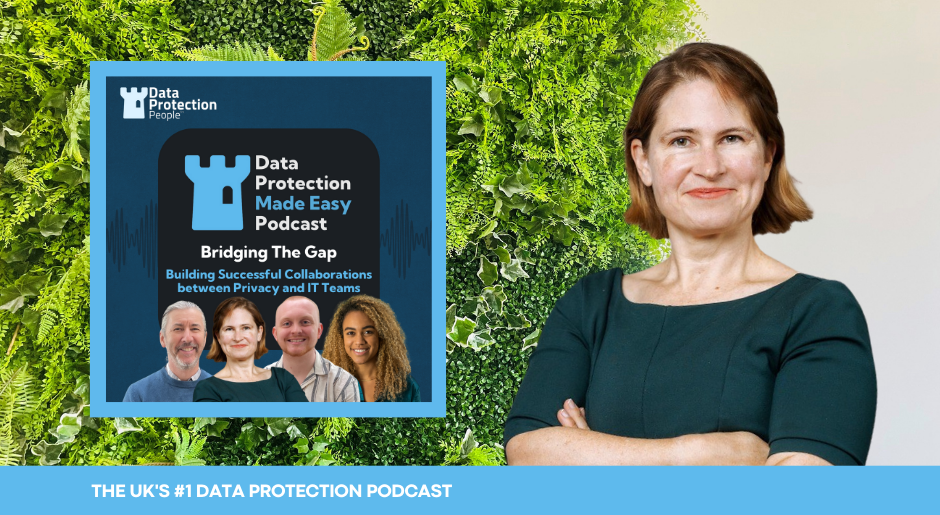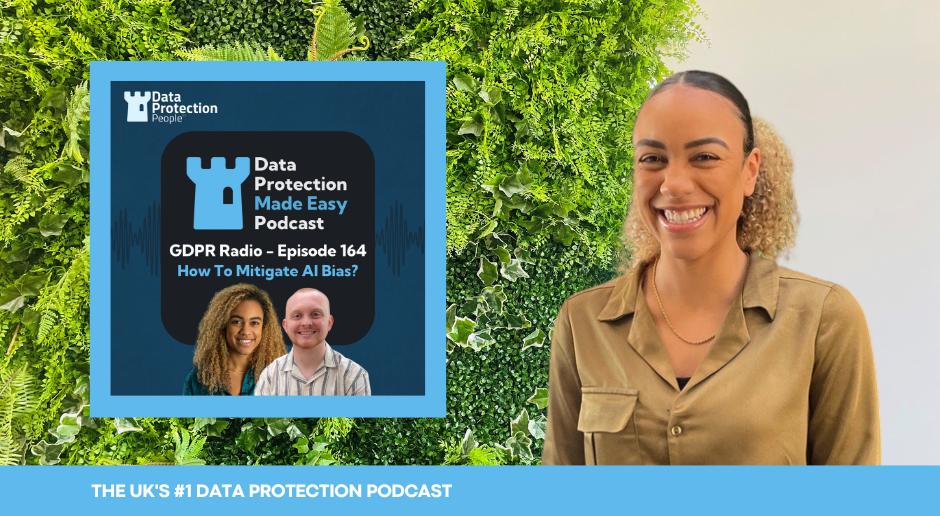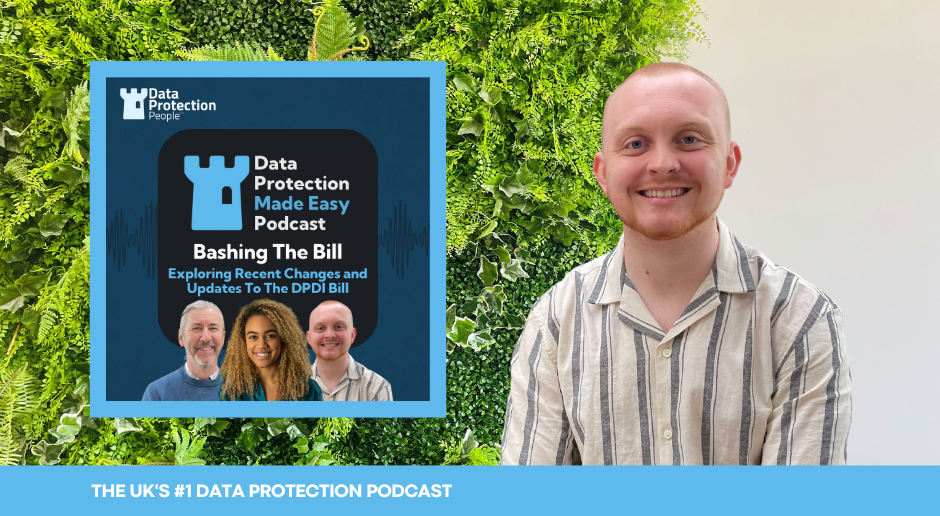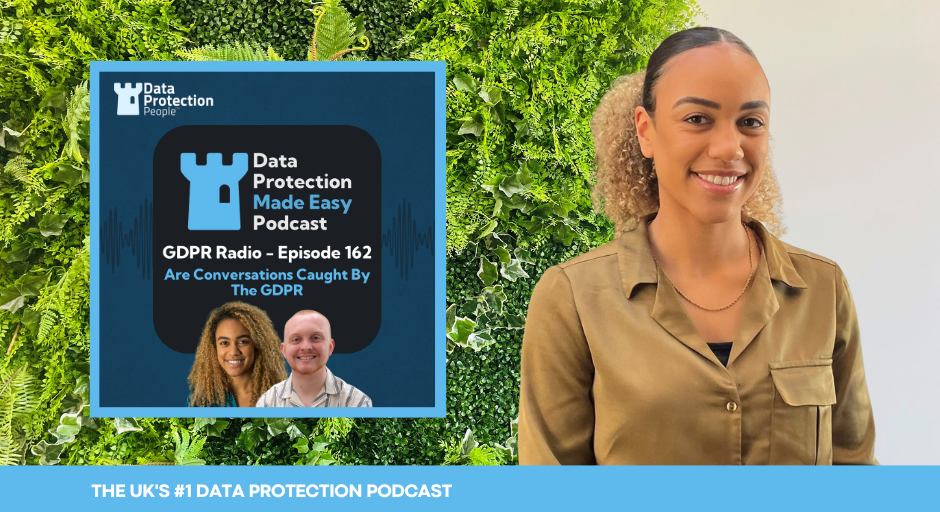Resources
Podcasts, Guides, Updates & More

Data Protection People Blogs
Data Privacy Learning & Guidance
Our mission is to make data protection easy: easy to understand and easy to do. Our weekly podcasts are available in our Resource Centre along with a collection of articles, white papers, useful guidance, templates, case law, and opinions – providing you with tools you can utilise in your workplace.
Grindr Faces UK Lawsuit
Grindr Faces UK Lawsuit Over Alleged Sharing of HIV Data
Grindr, the popular dating app for gay, bi, trans, and queer people, is under fire for its data protection practices. Hundreds of users in the UK have filed a lawsuit against the company, alleging that their private information, including HIV status, was shared with third parties without their consent.
Grindr Accused of Disclosing Sensitive Data
“Grindr is facing a mass data protection lawsuit from numerous users who have been affected by a personal data breach,” says Joe Kirk, a data protection expert at Data Protection People. “The lawsuit alleges that Grindr disclosed users’ HIV status and test results, to third parties for commercial purposes.” This information is considered special category data under UK law.
Special Category Data Requires Extra Protection
Data Protection People emphasises the sensitivity of the information allegedly disclosed. “HIV status and test results are classified as special category data because it can have a significant impact on someone’s rights and freedoms if misused,” explains Kirk.
Grindr Denies Wrongdoing
Grindr has responded to the lawsuit, stating they will “respond vigorously to this claim, which appears to be based on a mischaracterisation of practices from more than four years ago.” The company further claims they’ve “never shared user-reported health information for ‘commercial purposes’ and has never monetised such information.”
Uncertainties Remain
“Without a complete understanding of the situation, it’s difficult to say definitively whether Grindr violated UK data protection law,” says Kirk. “However, if the allegations are true, it seems unlikely that users would have consented to having their sensitive medical information shared with third parties for commercial gain.”
Data Protection Requires Constant Vigilance
This lawsuit highlights the ongoing challenges surrounding data protection. “There’s still a lot of work to be done to ensure organisations understand their responsibility to protect user data, especially sensitive information,” concludes Kirk. “This is a wake-up call for businesses to prioritise data protection and user privacy.”
Understanding the Impact
“This lawsuit goes beyond a typical data breach,” explains Joe Kirk, a data protection expert at Data Protection People. “HIV status is classified as special category data under UK law due to its sensitive nature. If misused, it can lead to discrimination, stigma, and even physical harm.”
Kirk elaborates on the potential consequences:
- Loss of Trust: Individuals using dating apps expect a safe space to connect. A breach of sensitive data like HIV status can shatter user trust and damage the reputation of the platform.
- Psychological Distress: The fear of discrimination or potential misuse of their health information can cause significant anxiety and emotional distress for users.
- Financial Repercussions: Depending on the nature of the data shared, there’s a risk of financial repercussions, such as increased insurance premiums, if leaked information falls into the wrong hands.
Lessons for Businesses: Prioritising Data Protection
This lawsuit serves as a stark reminder for businesses handling sensitive user data. Here are some key takeaways for organisations to consider:
- Transparency and Consent: Absolute transparency regarding data collection and usage practices is crucial. Obtaining clear and informed consent for handling sensitive data is paramount.
- Robust Security Measures: Implementing robust security measures to protect sensitive data is essential. This includes regular vulnerability assessments, data encryption, and access controls.
- Data Minimisation: Businesses should only collect and store the data absolutely necessary for their operations. The less sensitive data you hold, the lower the risk of a breach.
- Regular Reviews and Audits: Conducting regular reviews and audits of data protection practices helps identify and address potential vulnerabilities before they become critical issues.
- Data Breach Response Plan: Having a clear plan in place for responding to data breaches minimises damage and ensures a swift and effective response.
Rebuilding Trust and Protecting Privacy
The outcome of the Grindr lawsuit remains to be seen. However, it highlights the vital role data protection plays in today’s digital age. Businesses must prioritise robust data protection practices to safeguard user privacy, build trust, and avoid costly legal ramifications.
Breach Support
Data Protection People are able to support you with data breaches. More importantly support your efforts to ensure they don’t occur at all. We have a dedicated support desk with epxerts trained to help you manage breaches. We also have dedicated consultants who can support you on your journey to compliance. Maintaining breaches is not always about the compliance of the organisation but sometimes the awareness of the individuals in the organisation. We also have breach training designed to teach your organisation to take responsibility with the sensetive data within a business. Get in touch and see how we can support you. Contact Us Here.
Reference: Grindr facing UK data lawsuit for allegedly sharing users’ HIV status Reuters: https://www.reuters.com/technology/grindr-facing-uk-lawsuit-over-alleged-data-protection-breaches-2024-04-22/
Can AI be Racist?
Technology continues to reshape our world, offering solutions that streamline daily tasks and enhance security. However, with every innovation comes a responsibility to acknowledge its potential downsides. This blog post dives into the question can AI be Racist? and focuses two key areas where the ethical use of technology is paramount: facial recognition and data privacy.
The Shadowy Side of Facial Recognition: Can AI Be Biased?
Facial recognition (FR) technology promises a world of convenience, from unlocking smartphones to streamlining security checks at airports. But concerns linger about its inherent bias. Here’s why:
-
Biased Data, Biased Results: Facial recognition (FR) thrives on vast amounts of data to identify faces. However, the real challenge is if this data primarily reflects a certain race or ethnicity, the system struggles with faces outside that group. This can lead to misidentification and unfair targeting of minorities.
-
Perpetuating Racial Profiling: FR’s integration with law enforcement raises concerns about racial profiling. Historically marginalised communities already face disproportionate scrutiny. FR can exacerbate this by amplifying biases already present within the justice system.
-
Privacy Concerns: The widespread use of FR raises serious privacy issues. Facial data is highly personal, and its collection and use without proper safeguards can lead to mass surveillance and a chilling effect on free movement. Imagine a world where facial recognition cameras track you everywhere you go. This raises serious concerns about the erosion of personal liberty. Would you feel safe or constantly under surveillance?
Can AI itself be racist? AI is a tool, and like any tool, it reflects the biases of its creators and the data it’s trained on. To mitigate these risks, we need:
Diverse Datasets: Training data for FR algorithms should be inclusive, reflecting the variety of human faces across races, ethnicities, genders, and age groups. This ensures the system can accurately identify everyone, regardless of background.
Transparency and Oversight: Clear guidelines and regulations are needed to govern the development and use of FR technology. Independent oversight bodies can ensure responsible implementation and prevent misuse.
Public Dialogue: Open discussions are crucial to ensure that FR serves society fairly and ethically. Let’s Start a Conversation About Facial Recognition. We need to openly discuss the potential benefits and drawbacks of this technology. By having these conversations, we can ensure that FR is used in a way that respects human rights and protects individual privacy.
Balancing Data Privacy with Employee Well-being in a Mental Health Crisis
The workplace has a responsibility to support employee well-being. However, we must balance data privacy with employee well-being. Here’s how organisations can create a supportive environment while respecting individual privacy:
- Empower Employees Through Data Transparency: Your employees deserve to know exactly what data is collected during work hours. Build trust by clearly communicating the information you gather, how it’s used, and who has access to it. This transparency empowers employees to make informed decisions about their data privacy.
- Support Employees in Crisis, Not Punish Them: During a mental health crisis, data collection should solely focus on providing immediate support to the employee. Punitive measures have no place in this situation. Your primary goal should be to connect the employee with resources and ensure their well-being. The primary goal is to connect the employee with resources and ensure their well-being.
- Opt-in Systems: Consider systems where employees can choose to share data relevant to their mental health needs with a designated support team. This empowers employees to seek help while maintaining control over their data.
- Data Security: To safeguard this sensitive information, ensure robust data security measures are in place. This includes encryption, access controls, and regular audits to prevent unauthorised access or data breaches.
Decoding the Legalese: Lawful Basis for Data Sharing Made Easy
Data sharing is essential for businesses to operate effectively. However, navigating the legalities, particularly around the General Data Protection Regulation (GDPR), can be complex. Here’s a simplified breakdown of the lawful basis for data sharing under GDPR:
You Must Get Explicit Consent: Individuals have the right to control their data. Before sharing any personal information, you need to obtain their clear and specific consent. This means asking for their permission in a way that’s easy to understand and allows them to freely choose.
Sharing to Fulfill a Contract: When you enter into a contract with us, we may need to share your data to fulfill that contract. For example, if you order something online, we might share your address with a delivery company to get it to you. For example, you can share customer information with a delivery service to complete an order they placed.
Sharing When Required by Law: Sometimes, the law requires you to share data. This could involve reporting financial transactions to tax authorities.
Sharing for Legitimate Reasons (with Limits): You can share data for your own legitimate interests, but only if those interests don’t outweigh individual privacy rights. An example could be sharing anonymised data for market research purposes.
Conclusion
Technology offers immense potential to improve our lives. However, its ethical implementation is crucial. By addressing bias in facial recognition, respecting data privacy in the workplace, and understanding the lawful basis for data sharing, we can ensure technology serves humanity for the better.
Concerned about navigating the complexities of data privacy? Our data protection support services can help. We offer a comprehensive suite of solutions to ensure your organisation is compliant and ethical in its data practices. Contact us today to learn more!
How to Successfully Communicate Between Privacy and IT Teams
Data protection regulations like the UK GDPR and CCPA are constantly evolving, placing immense pressure on organisations to ensure compliance. But achieving a robust data security posture isn’t solely the responsibility of the legal or compliance teams. In today’s data-driven world, engineers play a pivotal role in safeguarding sensitive information. This blog explores how to successfully communicate between privacy and IT Teams.
Engineering: The Backbone of Data Security
Modern applications and systems collect, store, and process vast amounts of data. Engineers are the architects behind these systems, and their decisions directly impact data security. By working collaboratively with engineers from the get-go, data protection teams can:
- Embed security by design: Integrate data protection principles into the development lifecycle, minimising vulnerabilities from the start.
- Implement robust access controls: Engineers can build systems that restrict access to sensitive data based on the principle of least privilege.
- Automate data security tasks: Leverage automation for encryption, data anonymisation, and audit trails, freeing up resources for more strategic initiatives.
Communicating Privacy Concerns: Speaking the Engineer’s Language
Effective communication is paramount when addressing privacy concerns with engineers. Here are some strategies that resonate with a technical audience:
- Focus on impact, not just regulations: Explain how data breaches can compromise user trust and disrupt operations, not just incur fines.
- Provide clear technical guidance: Offer practical solutions and best practices for secure coding, data storage, and access management.
- Use real-world examples: Illustrate the consequences of data breaches with relevant case studies.
Avoiding Common Pitfalls: Building a Strong Foundation
Several hurdles can impede successful collaboration between data protection and engineering teams. Here’s how to overcome them:
- Lack of awareness: Organise training sessions to educate engineers on data protection principles and their role in achieving compliance.
- Siloed teams: Break down communication barriers by fostering regular interaction through workshops, code reviews, and joint project teams.
- Friction between security and functionality: Find the right balance between data security and user experience. Involve engineers early in the design process to ensure robust security doesn’t hinder functionality excessively.
Building a Collaborative Future
By fostering positive working relationships, data protection and engineering teams can achieve a shared goal: robust data security. Here are some tips:
- Promote open communication: Encourage engineers to raise concerns and propose solutions without fear of reprimand.
- Recognise and reward contributions: Acknowledge the efforts of engineers who champion data security practices.
- Celebrate successes: Highlight successful data protection initiatives to boost team morale and commitment.
Taking Data Protection to the Next Level
Our data protection services can empower your organisation to achieve seamless collaboration between your engineering and data protection teams. We offer comprehensive solutions, including:
- Data protection impact assessments (DPIAs): Identify and mitigate risks associated with data processing activities.
- Data security awareness training for engineers, tailored to your specific needs.
- Development of data protection policies and procedures aligned with best practices and relevant regulations.
By partnering with us, you can build a culture of data security and ensure your organisation remains compliant in this ever-changing landscape.
With a focus on clear communication, shared goals, and a collaborative approach, data protection and engineering teams can work together to safeguard sensitive information and build trust with your users to ensure you can successfully communicate between privacy and IT Teams. Get in touch with us today!
GDPR for Small Business: Data Protection Explained
In March, our Data Protection Made Easy podcast hosts, Jasmine Harrison, Joe Kirk and Phil Brining, discussed the challenges small and large businesses face when complying with GDPR.
Data protection is considered a significant burden for small businesses. Resource constraints, compliance hurdles and a general lack of awareness make GDPR compliance seem like a distant goal.
But it doesn’t have to be.
This guide will help you learn about the UK GDPR, your obligations as a small business and what you must do to comply.
What Is GDPR?
The General Data Protection Regulation (GDPR) is a law safeguarding EU citizens’ rights around how organisations collect and store their personal data. It came into law in May 2018 but no longer applies to UK citizens after Brexit in 2020.
Instead, the UK have the Data Protection Act (DPA) 2018, which follows the same GDPR requirements with some slight modifications. The UK GDPR applies to UK organisations and those planning to sell to individuals in the UK.
Does GDPR Apply to Small Businesses?
Regulations, like fire safety, health and safety and tax, apply to every new and existing business. But what about the UK GDPR?
This regulation impacts any business that handles, processes or stores personal data. This can include information about your employees, customers or third parties.
As a UK business, you must pay a data protection fee to the Information Commissioner’s Office (ICO) for processing personal data. Charities and small and medium-sized businesses pay £40-£60 a year. The yearly fee will increase to £2,900 for companies with a higher turnover and a larger team of employees.
By paying this fee, your business will appear on ICO’s register, showing customers that your business prioritises data security.
Personal Data & Sensitive Personal Data
The UK GDPR defines ‘personal data’ as:
“‘Personal data’ means any information relating to an identified or identifiable natural person (‘data subject’); an identifiable natural person is one who can be identified, directly or indirectly, in particular by reference to an identifier such as a name, an identification number, location data, an online identifier or to one or more factors specific to the physical, physiological, genetic, mental, economic, cultural or social identity of that natural person”.
Simply put, personal data refers to information about an individual (or ‘data subject’). What data this includes, however, isn’t exactly clear. The context of how you’ve collected information also matters when deciding whether it’s classed as personal data.
As a small business, you would’ve already collected several pieces of information on a single data subject. When put together, all this data can be used to identify the person. Personal data can include name, surname, home or email address, location data and an IP address.
Sensitive personal data, or special category data, includes information about an individual’s race, ethnicity, political opinions, religious beliefs or health history. Explore the full list of sensitive data in ICO’s complete guide. If you’re collecting this data, you need a clear reason for doing so.
What Are Your Legal Obligations?
If your business processes and stores customers’ personal data and is located in the UK, you must meet the requirements of the UK GDPR.
If you plan to sell to customers in the EU, you must comply with the EU GDPR. This also applies if you are based in the EU and selling in the region.
Non-compliance can risk fines of up to £17.5 million or 4% of your global turnover (whichever is higher) in the UK.
Getting Started with GDPR Compliance
Here are our top tips for complying with UK GDPR for small businesses:
- Start data mapping – Identify and document all the personal data you collect in your organisation. Define the purpose and lawful process for handling and processing each category. Data mapping is a key part of a successful GDPR audit.
- Conduct a Data Protection Impact Assessment (DPIA) – A DPIA is a risk assessment required under the UK GDPR for specific types of processing. These assessments will identify and prevent potential risks to data processing.
- Assign a Data Protection Officer (DPO) – A DPO is your dedicated GDPR expert. They’ll ensure compliance throughout your team and organisation. Our DPO Lite Service is ideal for small businesses needing straightforward support.
- Train Your Employees – Whether you’re a team of one or ten, your employees must have the skills, knowledge and experience to maintain compliance. Our GDPR training covers key areas like ROPAs, SARs and data breach management.
Is Your Business GDPR Compliant?
Ensuring GDPR compliance early on will allow your small business to mitigate any data protection and privacy challenges before they become too complex.
Partner with Data Protection People to start your journey to GDPR compliance. Reach out to our team to learn more.
Want to learn more? Listen to part 1 on data protection challenges for businesses on Spotify, Apple, Deezer or directly in our Resource Centre.
Data Protection People Podcasts
Data Privacy Learning & Guidance
Bridging The Gap
Bridging The Gap – Building Successful Collaborations Between IT and Privacy Teams
Listen to the full podcast here:
During last week’s episode of the Data Protection Made Easy Podcast, we were thrilled to welcome Rebecca Balebako, a Privacy Engineer with extensive experience in the field. Rebecca joined our hosts Joe, Jasmine, and Philip for a lively discussion on the critical collaboration between IT and Privacy teams.
Why Collaboration Matters
A successful business thrives on a strong partnership between IT and Privacy teams. This episode dives deep into how these seemingly separate entities can work together seamlessly to achieve a common goal: data protection.
Key Takeaways from the Discussion
- Shared Objectives: Both IT and Privacy share the responsibility of safeguarding data. By fostering open communication and understanding each other’s roles, they can develop effective strategies to achieve this goal.
- Breaking Down Silos: Historically, IT and Privacy teams may have operated independently. This episode emphasises the importance of breaking down these silos and fostering a collaborative environment.
- Privacy by Design: Integrating privacy considerations from the very beginning of IT projects strengthens data protection measures.
Join Our Community
Subscribe below to receive weekly invites to our live discussions. Here, you’ll benefit from:
- Networking: Connect with other data protection enthusiasts.
- Shared Resources: Gain access to tools and resources designed to simplify data protection tasks.
- Live Chat: Ask questions directly to our experts and fellow listeners during the show.
- Polls & Insights: Participate in interactive polls and gain valuable insights from data protection statistics.
Flexible Options to Suit Your Needs
We alternate between two session formats:
- Topic Sessions: Like this episode, we take a deep dive into a specific area of data protection or cybersecurity.
- GDPR Radio: Our expert hosts discuss the latest data protection news, offering insights and tips to address current challenges.
You can choose the sessions that most interest you! With roughly 100 data protection enthusiasts joining us live each week, you’re sure to find a vibrant and informative community.
Listen On-the-Go
Catch up on previous episodes wherever you are! We’re available on Spotify, Youtube, and Amazon Music. Our lighthearted and casual approach makes data protection understandable and engaging, perfect for listening at the gym, during your commute, or even while cooking.
Join us each Friday for insightful discussions and stay ahead of the curve in the ever-evolving world of data protection.
Looking Ahead
Next week, tune in for an episode of GDPR Radio featuring Jasmine Harrison, Joe Kirk, and Philip Brining. Register for upcoming events on our events page or reach out to us on LinkedIn.
GDPR Radio – Episode 164
Data Protection Made Easy Podcast: GDPR Radio – Episode 164
Deep Dive into Facial Recognition, Mental Health, and Legal Basis
This week’s episode of the Data Protection Made Easy podcast (GDPR Radio – Episode 164) tackles critical data privacy issues impacting our world today. Join hosts Jasmine Harrison and Joe Kirk as they delve deeper than ever before, offering insights and practical takeaways.
Key Topics Discussed:
Facial Recognition and Bias
Facial recognition technology is rapidly advancing, but concerns linger about potential bias within AI systems. Jasmine and Joe unpack this complex issue, exploring:
-
- Real-world examples of facial recognition bias in the news.
- The impact of biased algorithms on individuals and society.
- Mitigation strategies to ensure responsible development and deployment of facial recognition technology.
Data Sharing for Mental Health Emergencies
The Information Commissioner’s Office (ICO) recently issued new guidance on data sharing in mental health emergencies. This episode dives into:
-
- The key takeaways from the ICO’s guidance.
- Balancing data protection principles with supporting employee well-being during a crisis.
- Practical tips for organisations on developing a data sharing policy for mental health emergencies.
Lawful Basis for Data Sharing
Jasmine takes a deep dive into a specific case study involving the BearTrue blue app. This case raises important questions about:
-
- Identifying the appropriate lawful basis for data sharing in different scenarios.
- Applying data protection principles to real-world situations.
- The importance of understanding legal frameworks to ensure data sharing compliance.
Beyond the Headlines:
This episode goes beyond simply summarising the news. Jasmine and Joe use their expertise to:
Expand Your Data Protection Knowledge:
- Listen to the episode: Tune in using the podcast player embedded on our website.
- Tune in on Spotify: Listen back to over 160 episode of the podcast on Spotify or all major audio boom.
- Subscribe for more: Follow Data Protection Made Easy on Spotify, Apple Music, or your preferred podcast platform to never miss an episode.
- Join the conversation: Share your thoughts and questions on social media using #DataProtectionMadeEasy.
Don’t miss this opportunity to gain valuable insights from data protection experts! This episode equips you with the knowledge to navigate the ever-evolving world of data privacy with confidence.
The DPDI Bill
Bashing the Bill – A Deep Dive into The DPDI Bill (Episode 163)
DPDI Bill Under the Microscope: A Livestreamed Discussion with Data Protection Experts
Our most popular episode yet, “Bashing the Bill” (Episode 163), tackled the controversial Data Protection and Digital Information (DPDI) Bill with a bang! Held in front of a live audience of over 150 listeners and now topping the charts on Spotify, this episode delved deep into the implications of this new legislation.
Join the Conversation: Become a Data Protection People Subscriber
Intrigued by the DPDI Bill and its potential impact? Want to stay ahead of the curve on data protection issues? By subscribing to Data Protection People, you gain exclusive access to weekly invites for our live events, including in-depth discussions like “Bashing the Bill.” This allows you to not only tune in to expert discussions but also actively participate by asking questions and engaging in the lively chat function alongside our 1200+ subscribers from diverse backgrounds.
Is the DPDI Bill Fit for Purpose? Our Experts Weigh In
“Bashing the Bill” featured a dynamic conversation with our data protection experts, Jasmine Harrison, Joe Kirk, and Phil Brining. They dissected the key provisions of the DPDI Bill, sparking a critical analysis of its potential consequences. Here are some of the key questions explored:
What is the DPDI Bill and Why Should You Care?
The DPDI Bill is a significant piece of legislation that amends existing data protection regulations in the UK. Its aim is to streamline data processing procedures and potentially reduce compliance burdens, particularly for smaller businesses. However, the potential impact on individual privacy rights has sparked critical discussions.
Key Provisions of the DPDI Bill Explained
Here’s a breakdown of some key provisions in the bill and the potential consequences:
- Subject Access Requests (SARs): The bill introduces changes to SARs, which allow individuals to access the data companies hold on them. Critics worry these changes cou make it harder to obtain information, hindering your ability to understand how your data is being used.
- Data Sharing and National Security: The bill allows for broader data sharing under the umbrella of “national security” and “crime prevention.” This raises concerns about increased government surveillance powers, with limited clarity on how this data reuse will be restricted.
- Information Commissioner’s Office (ICO) Oversight: The bill grants the government more control over the ICO, the data protection regulator. This could limit the ICO’s ability to hold companies accountable for data breaches or data misuse, potentially reducing transparency and accountability.
Controversial Aspects of the DPDI Bill
Experts, Jasmine Harrison, Joe Kirk, and Phil Brining, delved into the controversial aspects of the bill during the episode:
- Weakening Privacy Safeguards: The potential for less robust data protection measures due to streamlined processes is a major concern. Striking a balance between simplification and strong data protection practices is crucial.
- Reduced Individual Control: The potential for making it harder to access your personal data and hold organizations accountable raises concerns about individual privacy rights taking a backseat to business interests.
- Unclear Exemptions and Ambiguities: The bill introduces a range of exemptions and limitations on data protection obligations. The sheer volume and potentially vague wording could create difficulties for individuals to understand their rights and for businesses to comply responsibly.
The Live Audience Discussion: A Hive of Activity
The live audience of over 150 participants actively engaged in the discussion through the chat function:
- Will the DPDI Bill make data breaches more common?
- How can individuals protect themselves under the new regulations?
- What does the bill mean for the future of data protection in the UK?
Our experts addressed these questions and many more, fostering a space for informed discussion and empowering individuals with knowledge.
Join the Data Protection People Community: Stay Informed, Take Action
By subscribing to our platform, you gain access to valuable resources, including:
- Live Q&A sessions and in-depth podcasts: Deepen your understanding of the DPDI Bill and other data protection topics through expert discussions.
- Practical guidance and actionable tips: Learn how to protect your personal information and hold organizations accountable for responsible data practices.
- A supportive community of privacy advocates: Connect with over 1200 individuals who share your concerns about data privacy. Together, we can be a powerful voice for change.
Don’t miss out! Subscribe to Data Protection People today and empower yourself with data protection knowledge. Let’s navigate the evolving data protection landscape together and ensure a future that prioritizes both individual privacy and responsible data use.
GDPR Radio – Episode 162
GDPR Radio – Episode 162
Data Protection News of the Week – 15th March 2024
Welcome back to Data Protection People! This episode of our podcast tackles a topic that’s been generating a lot of buzz.
As always, your expert hosts, Jasmine Harrison, Phil Brining, and Joe Kirk, are here to guide you through the intricacies of this new legislation. They pack a lot into this week’s session, from breaches to fines. Tune in to episode 162 and learn more.
A Deep Dive into the DPDI Bill
The episode dedicates significant time to dissecting the different aspects of the DPDI Bill. Here are some of the key areas our hosts explore:
- Impact on Businesses: A core focus is on how the bill affects businesses of all sizes. The hosts discuss potential changes in compliance requirements, how the bill might simplify processes for smaller organisations, and what larger entities need to consider for continued compliance.
- Transparency and Individual Rights: The conversation delves into how the DPDI Bill addresses individual rights regarding data access and control. Listeners can expect insights on potential changes to Subject Access Requests (SARs) and how the bill might impact individuals’ ability to understand and manage their personal information.
- Data Security and Enforcement: Data security remains a top priority. The episode explores how the DPDI Bill might strengthen data security measures and enforcement actions by the Information Commissioner’s Office (ICO).
- The Future of Data Protection: Our hosts don’t shy away from discussing the broader implications of the DPDI Bill. They analyse how this new legislation might shape the future of data protection regulations in the UK and beyond.
Beyond the Bill: Additional Insights
While the DPDI Bill takes centre stage, Episode 162 doesn’t stop there. The ever-resourceful Data Protection People team throws in some bonus insights for their listeners:
- ICO Fines in Focus: The episode dives into recent high-profile ICO fines, dissecting the lessons learned and how they can help organisations avoid similar pitfalls. This analysis equips listeners with practical strategies to strengthen their data protection practices and minimise the risk of regulatory action.
- Recent Breaches That Made Headlines: Data breaches continue to be a major concern. Episode 162 explores some of the most recent and impactful breaches that have made headlines. By analysing the causes and consequences of these breaches, the hosts provide valuable insights on how organisations can improve their data security posture and prevent similar incidents.
- Developing Technologies and Our Expert Opinions: The world of data protection is constantly evolving, with new technologies emerging all the time. The episode features insightful discussions from your trusted hosts on how these developing technologies impact data privacy. They share their expert opinions on the potential challenges and opportunities presented by these advancements, helping you stay ahead of the curve.
Stay Informed, Stay Compliant
The Data Protection and Digital Information Bill is a significant development in the world of data protection. By tuning into Episode 163 of Data Protection People, you can gain a comprehensive understanding of this new legislation. The episode equips you with the knowledge and insights you need to navigate the changing data protection landscape. Ensure your organisation stays compliant: tune in here: Bashing The Bill – Spotify
Would you like to listen to future episodes of the Data Protection Made Easy Podcast Live? Visit our events page.
Data Protection People Whitepapers
Data Privacy Learning & Guidance
How to Respond to a Data Subject Access Request (DSAR)
Read about how to properly handle a Data Subject Access Request (DSAR) as a data controller at an organisation who has received a request.
Do I need to do a DPIA?
Learn about Data Protection Impact Assessments (DPIAs) and how to manage them.
Data within Education
Data within Education Having joined Data Protection People as a graduate fresh from finishing Leeds Beckett University, my knowledge of GDPR and data protection was virtually non-existent, I was well and truly thrown in the deep end. You could say it was like learning how to run before I could walk. Luckily alongside having to…
Outsourced Consultant Versus In-House?
Do I need to do a DPIA? Whenever you implement a new processing activity, system, or process, you should consider whether a DPIA is needed. This should be done as early as possible in the process to allow time for the implementation of risk mitigation. Step One: is a DPIA legally required? The first thing…
Subscribe to Our Newsletter
Our mission is to make data protection easy: easy to understand and easy to do. We do that through the mantra of benchmark, improve, maintain.












